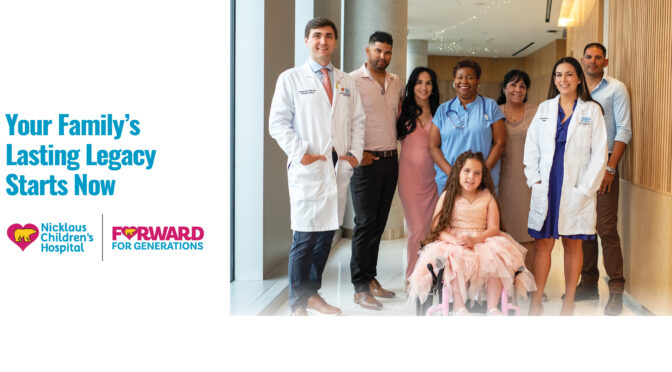Your Family’s Lasting Legacy Starts Now
What will be your legacy? You have the power to touch lives for generations when you plan today for the causes that will shape a healthier, stronger community tomorrow. Creating or updating a plan for your assets is one of the most meaningful things you can do for yourself and your family — and it doesn’t need to be complicated, with help from Nicklaus Children’s Hospital.
To get started, reflect on the loved ones and causes you’d like to support; update your beneficiary designations on your financial accounts; create a will that reflects your wishes and priorities; and enjoy the peace of mind that comes with knowing your loved ones — and your community — will be cared for long into the future.
Here are some quick steps to start your estate plan:
- Take inventory of your assets, including real estate, bank and investment accounts, retirement plans, life insurance, valuable items and personal property. Nothing is too small to count.
- Decide who you want to benefit, such as your family, friends and any charitable organizations close to your heart.
- Name a guardian for minor children and include this in your will.
- Choose someone you trust to carry out your wishes, either as an executor (for a will) or successor trustee (for a living trust).
- Designate powers of attorney for finances and healthcare, including end-of-life care, in case you’re unable to make decisions for yourself.
- Consult with an estate-planning attorney to help draft or update your will, trust and other legal documents tailored to your situation.
There are several ways that your estate can make an impact now:
Donor-Advised Fund (DAF) — You can recommend a grant from your donor-advised fund (DAF). A DAF is a charitable giving account that provides an immediate tax benefit to you and allows you to grant funds to charities of your choice at your own pace. Recommending a regular grant from your donor-advised fund annually, quarterly or monthly is a meaningful and flexible way to support a cause you care about. Contributions to your fund grow tax-free, leveraging the value of your philanthropy. To learn more about the benefits of using a donor-advised fund, visit www.nicklauschildrens.org/donoradvisedfund.
A Qualified Charitable Distribution (QCD) — For donors 70-and-a-half years and older, a qualified charitable distribution (QCD) from an IRA allows you to donate directly to the organization of your choice from your account, reducing your taxable income.
Appreciated Securities — Give more with less and save on taxes by donating appreciated stocks, bonds or mutual funds. You may be eligible for a charitable income tax deduction for the full market value of the stock (up to a maximum of 30 percent of your adjusted gross income) and avoid paying capital gains tax on any increase in the value of the stock.
A gift in your will or by beneficiary designation is a deeply personal reflection of your values and hopes for the future. These gifts require no immediate donation, yet they leave a lasting impact. There is more than one way to give through your will. Options include: giving a specific dollar amount or asset, like stock or real estate; leaving a percentage of your estate after taking care of family and loved ones; and naming a beneficiary of your life insurance, IRA, 401K, donor-advised fund or other account.
Some gift arrangements allow you to support Nicklaus Children’s Hospital while also securing your financial future:
Charitable Gift Annuities (CGA) — If you want the security of fixed lifetime payments, partly tax-free depending on how you fund it, a CGA might be right for you. You can also delay payments until retirement or another future date, typically receiving a higher rate then, while claiming a charitable deduction now. This option involves an irrevocable gift to the charity and provides dependable payments for life.
Charitable Remainder Trusts (CRT) — Choose a CRT if you would like to donate real estate or another asset that has appreciated in value, potentially replacing current income from the property while potentially deferring or avoiding significant capital gains tax that would otherwise be due on sale. A CRT allows you to be the trustee and retain some influence over investment decisions, while receiving payments that increase with gains in the value of the trust.
How to structure your gift depends upon your goals. If your goal is to create annual income, you might consider a charitable gift annuity and/or charitable remainder trust. If your goal is to reduce or defer income taxes, you might consider a bequest, retirement plan gift, charitable gift annuity, real estate and/or charitable remainder trust. If your goal is to reduce or eliminate capital gains taxes, you might consider a bequest, charitable gift annuity funded with appreciated stock, real estate and/or charitable remainder trust. Finally, if your goal is to lower estate taxes for your loved ones, you might consider a bequest, beneficiary designation, charitable remainder trust and/or real estate. This information is not intended as legal, accounting or other professional advice. For such guidance, be sure to contact a qualified professional.
For the last 75 years, the mission at Nicklaus Children’s Hospital has been to inspire hope and promote lifelong health for every child. It has been fueled by individuals and families who have aligned their assets with their charitable intent, while simultaneously ensuring their personal financial needs are met. By planning a future gift today, you can be part of that legacy of healing and hope.
To learn more about charitable giving at Nicklaus Children’s Hospital, contact Megan M. Brahimi, senior director of gift planning, at (267) 394-2211 or megan.brahimi@nicklaushealth.org. Visit https://myimpact.nicklauschildrens.org for more information.
